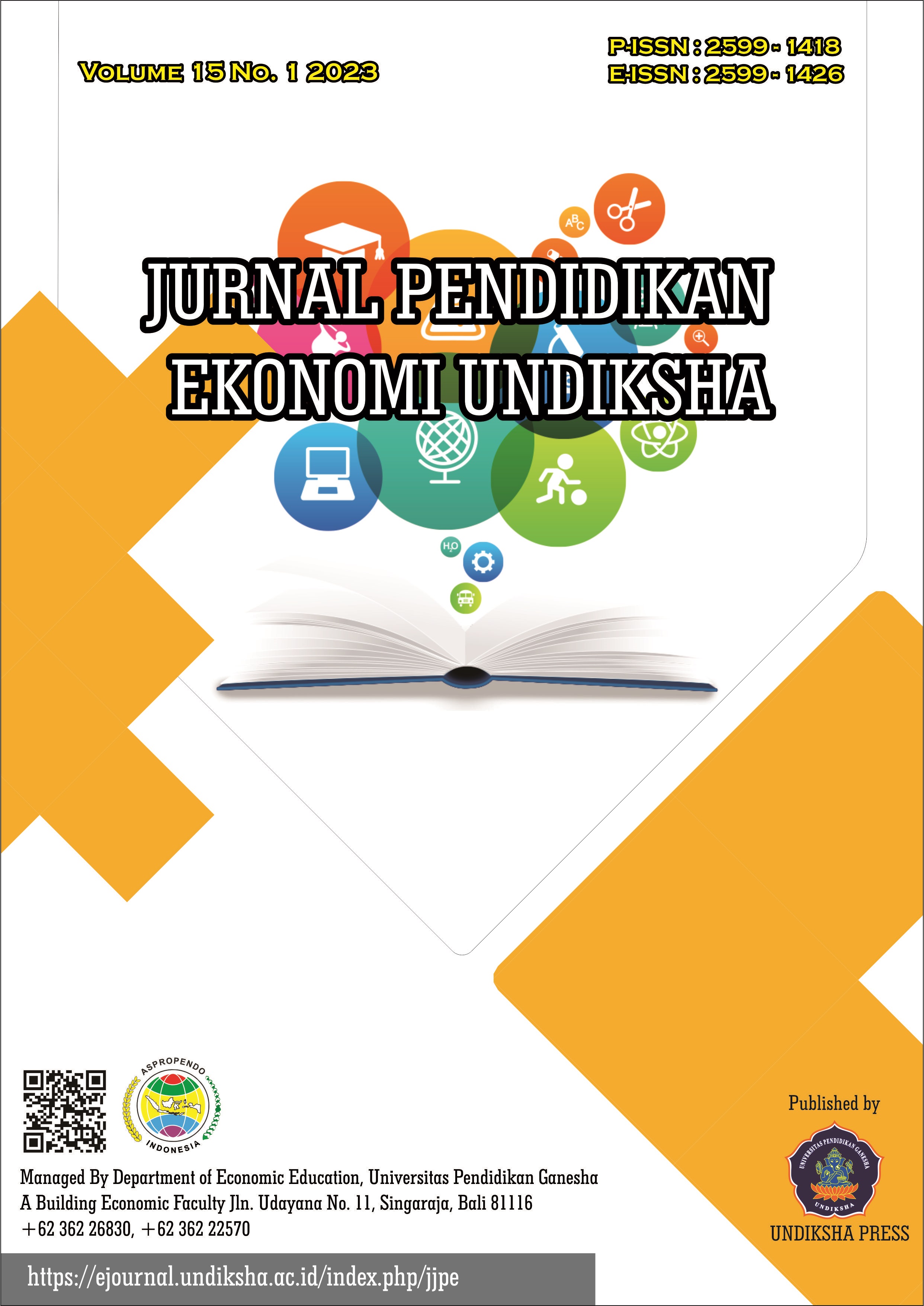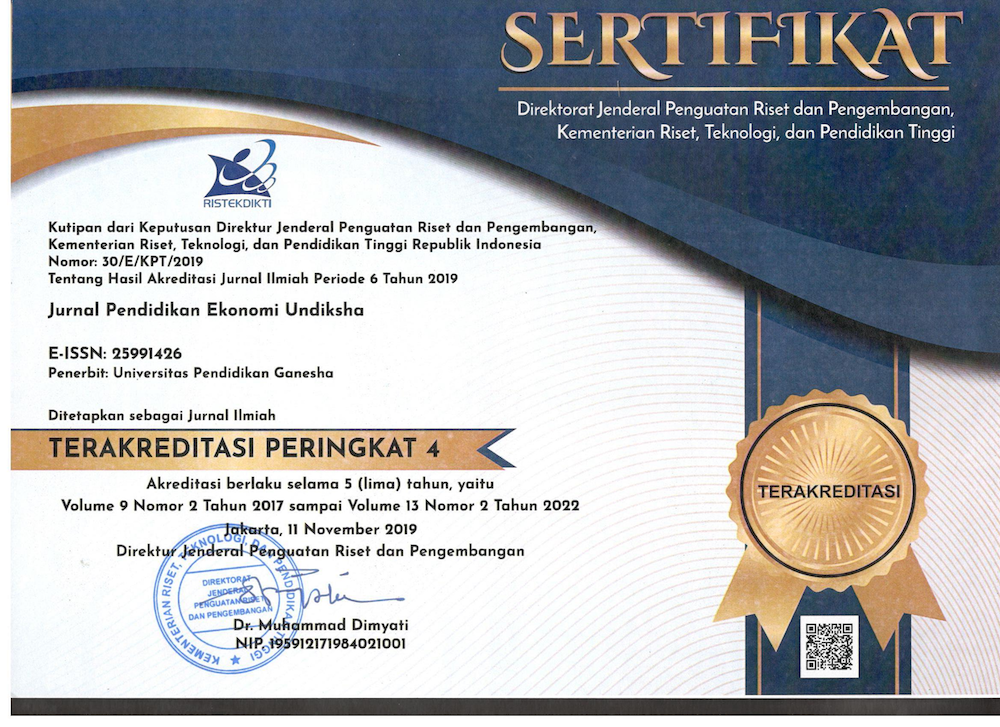Pengembangan Media Digital untuk Meningkatkan Literasi Ekonomi Siswa
DOI:
https://doi.org/10.23887/jjpe.v15i1.61463Keywords:
Economic Literacy, Digital Media, Borg and Gall ModelAbstract
The abstract version of the English is written using the English version of the British in past tense and appropriate sentences. The result and conclusions are written in the form of the present tense. Abstracts are expected to be more communicative and not monotonous. A simple sentence is English contains a minimum of subject and predicate elements. Economic literacy is the ability to use basic economic concepts and critical thinking in making decisions (Solihat & Arnasik, 2018). Therefore, economic literacy is one of the skills that must be possessed because economic literacy is a useful tool for changing behavior from unintelligent to intelligent. Like how to save, invest, protect and make ends meet (Sina Garlans, 2012). In the development of the ability to economics also continues to grow. One of them is the emergence of digitalization in economic activities. So it is important to have economic literacy needed in the modern era of the 21st century (Anggreini & Waspada, 2020), namely digital economic literacy, especially for high school students who are among the highest internet users in Indonesia. Because it is hoped that they can take a positive impact from the existence of the digital economy, and avoid digital crime. Therefore researchers conduct research and development using the Borg and gall procedural model, to produce products, namely digital media which are learning media that apply the use of technology, information, and communication to convey information (Jannah Noer Rahmawati & Atmojo Widianto Ragil, 2022), by loading digital economic material to increase students' economic literacy. The results showed that digital media is feasible to use in the very valid category with a combined validation result of 87.5%, consisting of 97% from media experts, 81% from material experts, and 86% from audiance validation. As well as being able to increase students' economic literacy with an n-gain test result of 0.68 which is in the moderate or quite effective category
References
Akbar, S. (2022). Intsrumen Perangkat Pembelajaran. PT. Remaja Rosdakarya.
Amanullah Abror, M. (2019). Pengembangan Media Pembelajaran Flipbook Digital Guna Menunjang Proses Pembelajaran Di Era Revolusi Industri 4.0. Jurnal Dimensi Pendidikan Dan Pembelajaran, 38–44. https://doi.org/http://dx.doi.org/10.24269/dpp.v0i0.2300
Anggreini, C., & Waspada, I. (2020). Kajian Literasi Ekonomi Siswa Sekolah Menengah Atas Al-Amanah Ciwidey. Indonesia Journal of Social Sience Education (IJSSE), 02. https://doi.org/http://dx.doi.org/10.29300/ijsse.v2i1.2731
Direktorat Keamanan Operasi Siber. (2021). Laporan Tahunan Monitoring Keamanan Siber 2021. Direktorat Operasi Keamanan Siber Badan Siber Dan Sandi Negara. https://bssn.go.id/laporan-tahunan-monitoring-keamanan-siber-tahun-2021/
Hamzah, A. (2019). Metode Penelitian dan Pengembangan. CV. Literasi Nusantara Abadi.
Handayati, S. (2020). Pengembangan Media Pembelajaran E-Book Dengan Memanfaatkan Fitur Rumah Belajar Pada Pada Mata Pelajaran Ipa. JIRA: Jurnal Inovasi Dan Riset Akademik, 1(4), 369–384. https://doi.org/10.47387/jira.v1i4.61
Jannah Noer Rahmawati, D., & Atmojo Widianto Ragil, I. (2022). Media Digital dalam Memberdayakan Kemampuan Berpikir Kritis Abad 21 pada Pembelajaran IPA di Sekolah Dasar. Jurnal Basicedu, 06, 1064–1074. https://doi.org/https://doi.org/10.31004/basicedu.v6i1.2124
Juniati, N., Jufri, A. W., & Yamin, M. (2020). Penggunaan Multimedia Pembelajaran Untuk Meningkatkan Literasi Sains Siswa. Jurnal Pijar Mipa, 15(4), 312–316. https://doi.org/10.29303/jpm.v15i4.1975
KOMINFO, Badan Penelitian dan Pengembangan SDM, & Puslitbang Aptika dan IKP. (2019). Perkembangan Ekonomi Digital di Indonesia. KOMINFO.
Kustandi, C., & Darmawan, D. (2020). Pengembangan Media Pembelajaran (1st ed.). Kencana.
Putra, A. R., & Dewi, M. R. (2021). PENGEMBANGAN MEDIA E-BOOK INTERAKTIF PADA SUB MATERI PERMINTAAN, PENAWARAN, DAN HARGA KESEIMBANGAN. Jurnl Pendidikan Ekonomi, 09, 1–7. https://doi.org/10.26740/jupe.v9n1.p1-7
Sina Garlans, P. (2012). Analisis Literasi Ekonomi. Jurnal Economia, 8. https://media.neliti.com/media/publications/19782-ID-analisis-literasi-ekonomi.pdf
Solihat, N., & Arnasik, S. (2018). Pengaruh Literasi EkonomiTerhadap Perilaku Konsumtif Mahasiswa Jurusan
Downloads
Published
How to Cite
Issue
Section
License
Copyright (c) 2023 Jurnal Pendidikan Ekonomi Undiksha

This work is licensed under a Creative Commons Attribution-ShareAlike 4.0 International License.





